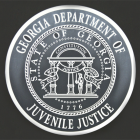
Study Re-Starts on Juvenile Justice Overhaul for Georgia
|
After more than five years of drafting, a comprehensive juvenile justice reform bill is expected to appear in the Georgia General Assembly in January, which would give children in the court system access to updated intervention and rehabilitation. A juvenile justice subcommittee will be formed soon out of the Special Council on Criminal Justice Reform, a blue-ribbon panel appointed by Gov. Nathan Deal to study adult and child justice codes. The full committee held its first meeting July16, where it heard a background briefing from the Pew Center on the States about juvenile justice in other states. The subcommittee will build on at least five years of work that ended in House Bill 641, a bill that died in the legislature in March. “We hope to find things to make improvements to the current 641,” said bill author state Rep. Wendell Willard (R-Sandy Springs). When it died in March, the 246-page bill brought the state’s juvenile justice code up to date with best practices about how to treat juveniles in the court system, whether as defendants, abuse victims or both. It also created a category of juveniles called “children in need of services,” who do things considered unruly, but not quite criminal, such as skipping school, running away from home, or breaking curfew.







